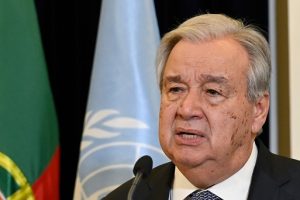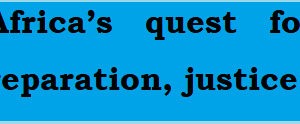BY SOLOMON WASSIHUN
The pioneers of the Pan-Africanism movement emerged a century ago. These visionary leaders saw the seed of the international struggle for equality and freedom and a better life for all people of African descent. One of the most important points in the teachings of the pioneers of Pan-Africanism was that people of African descent share a common destiny and that the unity of Africans is essential to the realization of the aspirations of Pan-Africanism. The movement believes that unity is essential for economic, social, and political progress and promotes the integration of people of African descent.
It can be argued that Ethiopia is the leading player in promoting Pan-Africanism because of at least two facts. First, it is a black nation that serves as living proof of the theories put forth by Pan-Africanist visionaries in the early 20th century. Ethiopia has always been a free, sovereign black nation and has never submitted to colonialists. It has its own remarkable indigenous civilization. What is more, the Ethiopians’ spectacular victory over European imperialism, the Adwa victory near the end of the 19 century, was the jewel in the crown that made Ethiopia the leading star for Pan-Africanism and thus contributed to the intensification of the black liberation movements around the globe.
The second point is Ethiopia played a pivotal and irreplaceable role in one of the major practical applications of the theories of Pan-Africanism. Scholars agree that the Pan-Africanism thoughts influenced the establishment of the Organisation of African Unity, the forerunner of the African Union, in 1963. Thus, Ethiopia is the nation that takes lion’s share of the credit for the genesis of the African Union.
The international prestige of Emperor Haile-Selassie coupled with the astute qualities of the Ethiopian diplomats of that time, like Foreign Minister Ketema Yefru, enabled Ethiopia to successfully play the middle ground and be a bridge between the two Pan-Africanist factions, the Monrovia group, and the Casablanca group that had differing strategies on the common objective of realizing the African unity. Had it not been for the relentless efforts of the Ethiopian leaders, the African Union we are talking about would have remained an imaginary or futuristic regional institution until today.
Ethiopia was the main benefactor during the early years of the establishment of OAU. Even some historians claim that it has sponsored the travel and accommodation of many of the delegates of the founding conference of the OAU held in 1963 here in Addis. Being the first Chairperson of OAU and the first Secretary General of OAU, the Ethiopian leaders played a key role as Pan-Africanist to help the OAU successfully pass through the critical stage of its early formative period.
Likewise, the Ethiopian leadership contributed more than their share in providing various supports for the realization paramount and immediate objective of the OAU, which was the liberation of all African states from colonialism. Despite its meager economic resources, Ethiopia provided various financial and training supports to liberation groups from various African countries fighting the colonial occupying powers.
South African legendary hero of the struggle against apartheid, Nelson Mandela, received his military in Ethiopia. The story does not end there. Ethiopia gave him an Ethiopian passport, enabling him to travel across nations to coordinate the global anti-apartheid struggle. The irony here is, when Ethiopia honor him and gave him citizenship, Mandela was on the blacklist of Americans, labeled as a terrorist, and banned from entering the US. Mandela’s name remained on the U.S. terrorism watch list till 2008, long after he served as the first black president of South Africa.
Despite a series of drastic regime changes the nation saw over the last half-century, Ethiopia’s commitment to the ideals of Pan-Africanism and its support for the realization of the visions and missions of the regional body has never waned. During the time of the Derg as well as the EPRDF regimes, Ethiopia continued to support the anti-colonialist struggle that culminated in the independence of the last remaining African states namely Zimbabwe[in 1980] and Namibia[in 1990] as well as the freedom of non -white South Africans from the shackles the racist apartheid system back in 1994.
Unfortunately, after the demise of colonialism and apartheid, Africa’s troubles did not show any sign of abating. Africa continued to suffer from political instability fueled by the insatiable selfish desire of foreign powers for African resources. A series of coup d’etats, civil wars, terrorism waves, political extremism, and border disputes have made African people’s lives miserable, forcing the continent to lag in economic progress and impeding it from fully utilizing its potential. Though there are lots of improvements and progress, the issue of peace and security remains a paramount challenge threatening to jeopardize the realization of AU’s development agenda. Africa has remained the continent with the grimmest statistics of poverty, IDPS, food insecurity, foreign debt, and violent change of regimes.
Even though Ethiopia itself is a victim of above-mentioned Africa’s misfortunes, the nation has contributed a lot to bring peace and security to the other parts of the continent beyond its borders. Ethiopia has sent its peacekeeping missions to various parts of the region as part of AU and UN peacekeeping missions. Official reports released last year indicated that Ethiopia holds the position of the second top contributor supplying around 8 percent of the UN peacekeeping force. Ethiopian forces have paid the ultimate price in peacekeeping missions in various parts of the world including African states like Somalia, Darfur [western Sudan], Congo, Rwanda, South- Sudan, Burundi, Liberia, Côte d’Ivoire…and so on.
Apart from being the seat of the headquarter of the African Union, and the UN economic commission for Africa, Ethiopia has been selected as the seat for the fifth component of the AU’s Pan-African University, and the construction of the university in the historic Adwa town was formally launched in 2017 jointly by the former Ethiopian Prime Minister Hailemariam Dessalegn and the Ugandan President Yoweri Museveni.
In addition, a yearly forum on Pan-Africanism, which made its debut last week as a sideline event to the grand 36th Ordinary AU summit. The forum organized by the state-run African Leadership Excellence Academy (AFLEX) gathered about 300 participants including African leaders. The forum aims to reinvigorate the spirit of Pan-Africanism, and inspired African scholars to contribute toward expediting the realization of the visions of Pan-Africanism. Over the last few days, the Ethiopian capital Addis Ababa has been brimming with the most powerful African men and women. Ethiopia shined more than ever as the nerve center of African politics. African leaders and diplomats converged and deliberated on the journey made so far, and the one ahead for 2 days toward the realization of the dream of Africans, Agenda 2063.
Last October, Ethiopia sponsored and hosted the First African Youth Summit creating another venue for senior African leaders to impart the spirit of Pan-Africanism among the prospective young African leaders drawn from more than 50 African states. In the three-day event held with a theme of promoting the integration of Africa, the participants pledged to follow in the footsteps of their forebears and contribute their share for the realization vision of AU per the timetable set in the agenda 2063.
Ethiopia not only spearheaded the efforts for the establishment and advancement of African unity. It also became a showcase validating the relevance of the continental body by practicing the popular word of wisdom of Pan-Africanists African solution for African problems. Ethiopia has ended the two-year bloody war in the northern part of the country by employing the wisdom of African leaders. Similarly, it is also Ethiopia’s unwavering stance that the unsettled GERD dispute could well be solved by exploiting the wisdom and insider knowledge of African experts, scholars, and statesmen.
Of course, 60 years on, after the establishment of the OAU, the power dynamics among African states have drastically changed. And yet, it is irrefutable fact that Ethiopia is still maintaining the lead as the foremost proponent and actor of pan-Africanism.In a paper he published about a decade ago, an AU affair analyst, Mehari Taddele wrote: “Pan-Africanism is consciousness. It is a high level of awareness about responsibilities, duties, and historical position of a country and a people.”
THE ETHIOPIAN HERALD WEDNESDAY 22 FEBRUARY 2023




